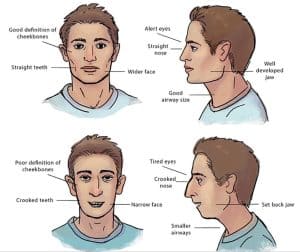It started when he was a baby and would get congested easily heading into the winter months. Of course he was the one I was group B strep positive and could not get out of taking antibiotics at his birth- bummer!
He would get croup or have severe retractions several times a winter and it even happened once on vacation in the summer. (Thanks to Direct Primary Care, our nurse practitioner could call in a prescription OUT of STATE, AFTER HOURS, for FREE if he needed it).
But in order to treat the respiratory illnesses we worked on gut health, decreasing sugar, and eliminating triggering foods from his IgG food testing. The foods he was sensititive to according to testing were egg whites, dairy, and pineapple.
He gets respiratory illnesses WAY less now but the mouth breathing is a habit and has stuck.
Why am I concerned that he breathes through his mouth?
Mouth breathing is associated with the following:
– decreased brain activation and connection
– bedwetting
– increased risk of sleep apnea
– increased risk of ADD/ADHD misdiagnosis
– chronic fatigue
– increased risk of headaches, TMJ pain
– increased risk of dental problems
– decreased productivity
– poor gut and oral health
– poorer quality of life
Whew, that’s a lot of consequences! Now, it’s not to scare you if you or a family member have been a mouth breather for a long time. But, it will hopefully shed light and give you new direction.
What are common signs of mouth breathing? (Other than being told you snore 😉
– Daytime Sleepiness
– Drooling
– Swollen tonsils
– Irritability
– Dry mouth, hoarseness
– Bad Breath
– Rashes, eczema, or allergies
You can also see the structural changes that occur over time. Your jaw, neck, and facial features change due to the compensation of tilting the head back, tightening the neck muscles, and opening the airway further.

There are all sorts of mouth breathing corrective devices on the market now. From chin straps to mouth tape and special mouth guards.
We had already been using a mouth guard during the day to practice nasal breathing, so we felt the best and most economical option for a toddler would be the kids sleep strips. Here is the brand of sleep strips we used. The sleep strip design gradually progresses so you’re still able to breathe through the mouth.
But can mouth taping or sleep strips actually correct mouth breathing?
One study showed that severity of snoring and apnea improved 50% in adult patients that used mouth taping. The researchers concluded that mouth taping could be a good treatment option prior to requiring a CPAP breathing machine.
If you’re struggling with mouth breathing or snoring, mouth taping is definitely worth discussing with your healthcare provider to see if it’s appropriate for you. I also recommend looking into inflammatory and dietary triggers as well as oral and gut health.
We will likely do a second round of mouth taping to continue to reinforce the nasal breathing. In fact, we noticed a trend. On the nights he was able to keep the tape on all night, he also had no incidence of bedwetting!
If you’re looking for help to resolve your symptoms of mouth breathing, check out our free consult link to speak with a functional medicine provider today.
—-
The recommendations above are for educational purposes only. Be sure to discuss any treatments with your primary care provider.
Sources:
https://www.ncbi.nlm.nih.gov/pmc/articles/PMC8228257/
https://www.endur.com/blogs/blog/8-scary-consequences-of-mouth-breathing#MainContent
https://www.healthline.com/health/mouth-breathing#advantages-of-nose-breathing
